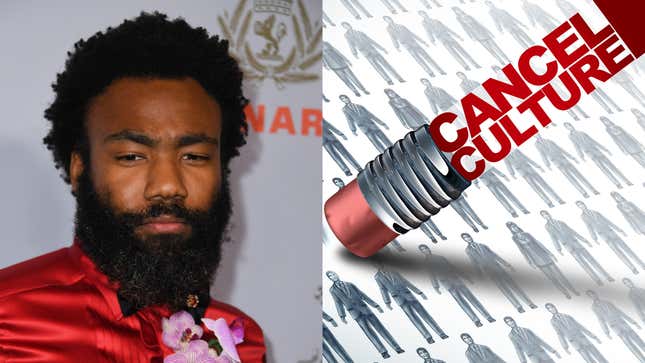
Oh, “Cancel Culture” discourse hasn’t been canceled yet?! Alrighty…
Not only has cancel culture not been canceled, but it’s not even just limited to comedians and other celebrities—it’s made its way into Congress. Father God...
Keeping its “song that doesn’t end” energy, the conversation was reignited thanks to the man who should be focusing on his FX show that has basically evaporated into the “coming soon” ether—or perhaps the recent lawsuit filed against him. That’s right, Donald Glover has now contributed to the Cancel Culture Cinematic Universe (CCCU).
“Saw people on here havin’ a discussion about how tired they were of reviewing boring stuff (TV & film),” Glover began on Monday night. Here we go!
Glover offered some reasoning behind that.
“We’re getting boring stuff and not even experimental mistakes(?) because people are afraid of getting cancelled,” Glover tweeted.
“So they feel like they can only experiment w/ aesthetic,” Glover concluded before adding the caveat, “(also because some of ‘em know they’re not that good).”
I’m glad he added that at the end, because let’s call a thing a thing! If anything, the same ol’ status quo of offensive content for the sole purpose of shock culture is what’s lazy and, frankly, boring. Widen those imaginations! I guess asking for a little bit of creativity is asking too much of creators, huh?
Let’s revisit the “threat” of cancel culture, though. As VSB contributor Danielle Butler wrote in 2018:
Cancel culture is paradoxical in that its opponents manage to claim it’s both harmfully punitive and performative virtue signaling. You’d be hard pressed to name a celebrity or public figure that has been summarily “canceled” by a large swath of the population—be it an online or offline community—and treated like a leper. Even the ones accused of the most egregious crimes manage to hold onto a core group of supporters. And with the passage of time—and the obligatory mea culpas penned on iPhone notes—many find themselves back in the public’s good graces within a matter of months or even weeks.
The term is quite the misnomer since it’s really just the fear of simple consequences, not cancelation. Consequences are a part of life, though. Plus, people with some sort of power and influence rarely see any true accountability, as the consequences (or social media call-outs) are typically fleeting, at best. The funniest thing—really, it’s hilarious–about celebrities lamenting about cancel culture is that the main reason we’re even hearing about it and aggregating constant quotes from them answering journalists’ questions about it is that they’re typically on a press tour for a major project. Doesn’t sound too much like canceling to me!
“Wahhhhh Wahhhh, cancel culture will lead to the destruction of content...oh, and by the way, make sure you tune into my major franchise film/TV show/podcast set to debut in 2022, as part of my multimillion-dollar overall deal with a major studio/streamer!”
Oh.
Update: 05/11/2021, 7:48 p.m. ET: I might as well point out that there could’ve been a different interpretation of Glover’s tweets to mean “canceled” as in “a canceled TV show.” Then again, it would’ve made more sense if he said the show was getting canceled and not the people. And I don’t hear that term used as often for films. Maybe more like... “shelved” or “dropped.” Yet, I digress! The overall sentiment is still evergreen and relevant, thus not... canceled. *wink*

